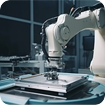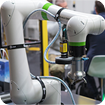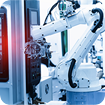Collaborative robots, or cobots, can provide valuable support to CNC (Computer Numerical Control) machines in various ways, increasing efficiency, flexibility, and safety in manufacturing processes.
Here are some ways cobots can collaborate with CNC machines:

Cobots can handle placing "raw materials" into CNC machines and, after the machining cycle, remove them from the equipment and place them into a storage system. They can also clean the equipment and finished pieces from generated chips.

Cobots can manage material movement around CNC machines, such as relocating workpieces between different machining stations or placing and removing raw materials or finished products from storage systems.

Designed to work alongside human operators, cobots can safely share the workspace with people, allowing a more flexible and adaptable manufacturing environment.

Cobots are easy to program, even by individuals without specialized programming knowledge, facilitating teaching tasks related to CNC machines for operators.

Cobots perform excellently in situations where frequent machine setups and handling of small batches occur. They can be quickly reprogrammed to adapt to various CNC machining tasks.

Collaborative robots are equipped with safety features such as force and torque sensors, enabling them to detect unexpected obstacles and stop or slow down to avoid collisions. This increases workplace safety when working closely with robots.
Integrating collaborative robots with CNC machines can result in a more flexible and efficient manufacturing process, enabling quick adaptation to changing production needs. Additionally, collaboration improves workplace safety by reducing risks associated with traditional industrial robots.